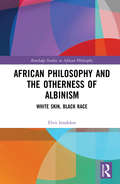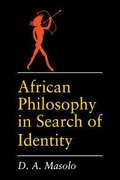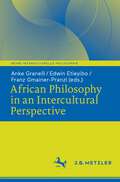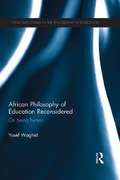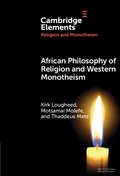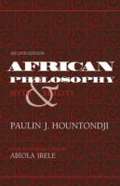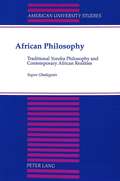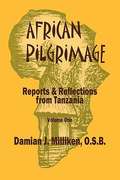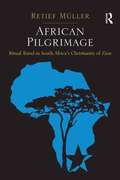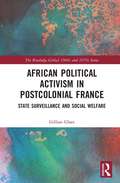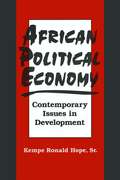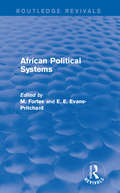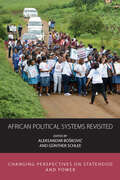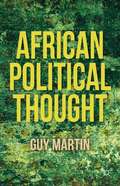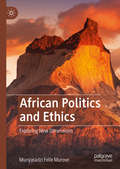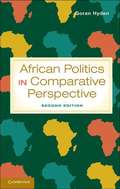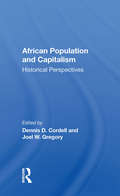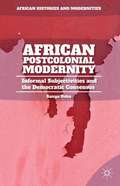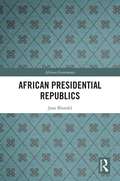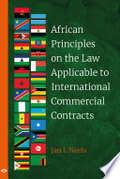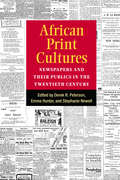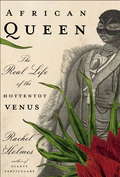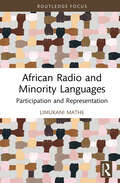- Table View
- List View
African Philosophy and the Otherness of Albinism: White Skin, Black Race (Routledge Studies in African Philosophy)
by Elvis ImafidonAlbinism is one of the foremost disability and public health issues in Africa today. It often makes headlines in local, national and international medias and forms the basis for intense advocacy at all levels. This is primarily due to the harmful representations of persons with albinism deeply entrenched in African traditions. These deeply rooted ideologies about albinism in African thought have largely promoted the continuous discrimination, stigmatization, harming, killing, commodification and violation of the human rights of persons with albinism in African places. How has albinism emerged as a thick concept in African traditions? What are these deeply entrenched ideas about the ontology of albinism in African thought? What epistemic injustice has been done to persons with albinism in Africa places? Why do harmful beliefs about albinism still persist in modern African societies? How does the African communalistic ethic justify the harm done against persons with albinism? What is the duty to, and burden of, care for persons with albinism? What peculiar existential challenges do persons with albinism in general and females with albinism in particular face in African societies and how can they be overcome? What can be learnt from the education philosophy of reconstructionism and genetic engineering in improving the wellbeing of persons with albinism? African Philosophy and the Otherness of Albinism: White Skin, Black Race digs deep into these philosophical questions revealing fascinating but latent aspects of how albinism is understood in African places as a necessary step to take in improving the wellbeing and integrity of persons with albinism in Africa today. This book will be of interest to scholars and students of African philosophy, sociology, African studies and disability studies.
African Philosophy in Search of Identity
by D. A. MasoloA Kenyan philosopher surveys themes and debates in African philosophy over the last five decades. Masolo's purview includes Francophone and Anglophone philosophers in both the analytic and phenomenological traditions.
African Philosophy in an Intercultural Perspective (Reihe Interkulturelle Philosophie)
by Anke Graneß Edwin Etieyibo Franz Gmainer-PranzlAfrican philosophy under the specific conditions of a colonial and postcolonial world is – at least since the 20th century if not even earlier – inherently intercultural. The aim and target of the volume is to reveal, interrogate and analyse the intercultural dimension in African philosophy, and to critically interrogate the project of an intercultural philosophy from an African perspective. This volume is the first publication that explicitly discusses African philosophy as a challenge to the project of intercultural philosophy.
African Philosophy of Education Reconsidered: On being human (New Directions In The Philosophy Of Education Ser.)
by Yusef WaghidMuch of the literature on the African philosophy of education juxtaposes two philosophical strands as mutually exclusive entities; traditional ethnophilosophy on the one hand, and �scientific� African philosophy on the other. While traditional ethnophilosophy is associated with the cultural artefacts, narratives, folklore and music of Africa�s peop
African Philosophy of Religion and Western Monotheism (Elements in Religion and Monotheism)
by Kirk Lougheed Motsamai Molefe Thaddeus MetzThe Abrahamic faiths of Christianity, Judaism, and Islam are typically recognized as the world's major monotheistic religions. However, African Traditional Religion is, despite often including lesser spirits and gods, a monotheistic religion with numerous adherents in sub-Saharan Africa; it includes the idea of a single most powerful God responsible for the creation and sustenance of everything else. This Element focuses on drawing attention to this major world religion that has been much neglected by scholars around the globe, particularly those working in the West or Northern Hemisphere. It accomplishes this primarily by bringing it into conversation with topics in the Anglo-American philosophy of religion.
African Philosophy: An Anthology
by Emmanuel Chukwudi EzeBringing together canonical philosophical texts from African, African-American, Afro-Caribbean, and Black European thinkers, this major new anthology is designed to serve both as a textbook and as the authoritative reference volume in Africana philosophical and cultural studies.
African Philosophy: Myth and Reality (Second Edition)
by Paulin J. Hountondji Jonathan Ree Henri EvansThis is a precious gem of a book for anyone who wishes to reflect on civilization and culture. --Choice In this incisive, original exploration of the nature and future of African philosophy, Paulin J. Hountondji attacks a myth popularized by ethnophilosophers such as Placide Tempels and Alexis Kagame that there is an indigenous, collective African philosophy separate and distinct from the Western philosophical tradition. Hountondji contends that ideological manifestations of this view that stress the uniqueness of the African experience are protonationalist reactions against colonialism conducted, paradoxically, in the terms of colonialist discourse. Hountondji argues that a genuine African philosophy must assimilate and transcend the theoretical heritage of Western philosophy and must reflect a rigorous process of independent scientific inquiry. This edition is updated with a new preface in which Hountondji responds to his critics and clarifies misunderstandings about the book's conceptual framework.
African Philosophy: Traditional Yoruba Philosophy and Contemporary African Realities
by Segun GbadegesinThe question whether or not there is African philosophy has, for too long, dominated the philosophical scene in Africa, to the neglect of substantive issues generated by the very fact of human existence. This has unfortunately led to an impasse in the development of a distinctive African philosophical tradition. In this path-breaking book, Segun Gbadegesin offers a new and promising approach which recognizes the traditional and contemporary facets of African philosophy by exploring the issues they raise. In Part I, the author examines, with refreshing insights, the philosophical concepts of the person, individuality, community and morality, religiosity and causality, focusing on the Yoruba of Nigeria. Part II discusses, in an original way, contemporary African social, political and economic realities from a philosophical perspective.
African Pilgrimage: Reports and Reflections from Tanzania (Volume One, 1960-1988)
by Damian J. Millikenthis is an autobiographical account of Fr. Damian J. Milliken's first twenty-eight years as a missionary in Tanzania. Each chapter contains several stories and/or essays about the land, the people and their culture.
African Pilgrimage: Ritual Travel in South Africa's Christianity of Zion
by Retief MüllerYears after the end of Apartheid South Africa remains racially polarized and socially divided. In this context pilgrimage and travelling rituals serve to help those who often find themselves at the bottom end of the social ladder to make sense of their world. This book describes a South Africa that is made up of a number of different fragmented worlds. The focus is on the Zion Christian Church, one of the largest religious movements in southern Africa, and a good example of indigenized African Christianity. Pilgrimage plays an important role in reintegrating some of those fragmented worlds into something approaching wholeness. This book tells the story of how the enduring ritual of pilgrimage is transforming African religion, along with the lives of ordinary South Africans.
African Political Activism in Postcolonial France: State Surveillance and Social Welfare (The Routledge Global 1960s and 1970s Series)
by Gillian GlaesAfrican Political Activism in Postcolonial France engages with several areas of scholarly inquiry, ranging from the study of immigrants to the investigation of surveillance and the legacy of colonialism. Within migration studies, many important analyses have focused on integration, yielding critical contributions to our understanding of immigration and identity. This work moves in a different direction. Factoring in the dynamics of colonialism, decolonization, and their effect on immigrant political activism and state policy in the postcolonial, Cold War era reveals that immigrants from francophone Sub-Saharan Africa were key players who shaped the development of public policy toward immigrants. Through this approach, we can understand how republicanism, colonial ideology, immigration policy, and immigrant political activism intersected in the post-colonial era, shaping the reception of African workers and affecting their lives and experiences in France.
African Political Economy: Contemporary Issues in Development
by Kempe Ronald Sr.This is a multidisciplinary book that analyses the problems and issues of development in Africa along with the attempts at, and outcomes of, policy reform measures that have been implemented to surmount those problems. Topics covered include the economic crisis in Africa, urbanisation and urban management, uneven development, the socio-economic context of AIDS, bureaucratic corruption and reform, and proposed development solutions.
African Political Systems
by E. E. Evans-Pritchard Meyer ForbesAfrican Political Systems is a foundational work in the field of anthropology and political science, edited by Meyer Fortes and E. E. Evans-Pritchard. First published in 1940, the book offers a comparative study of governance structures across various African societies, challenging earlier Western assumptions about political organization in non-Western cultures.Through a series of in-depth case studies, the book explores the diversity of political systems in African societies—ranging from stateless societies with decentralized authority to centralized kingdoms with hierarchical governance. It covers communities such as the Nuer, Zulu, and Bemba, revealing how political order is maintained through kinship ties, rituals, alliances, and local customs. Each chapter demonstrates how these systems reflect the unique cultural, social, and economic conditions of the communities they govern.The editors introduce key anthropological concepts, including the distinction between "primitive" and "modern" political systems, although later scholarship has criticized some of these categories. Nevertheless, African Political Systems remains a pioneering effort in understanding political organization outside the Western context, and it continues to influence research in anthropology, history, and political theory.With its rich ethnographic insights, the book offers readers an invaluable perspective on governance, authority, and social cohesion across Africa, making it an essential text for those interested in cross-cultural political studies.
African Political Systems (Routledge Revivals)
by M. Fortes E. E. Evans-PritchardFirst published in 1940 and this edition in 1987, this book is a comparative study of African political institutions. It describes different types of social organisation that are found in a number of African societies and analyses the principles underlying these traditional forms of government. The volume represents the results of field studies carried out by trained investigators in a number of areas, and was compiled and edited under the auspices of the International African Institute. It will be of interest to students, anthropologists and administrators.
African Political Systems Revisited: Changing Perspectives on Statehood and Power (Integration and Conflict Studies #26)
by Aleksandar Bošković Günther SchleeReexamining a classical work of social anthropology, African Political Systems (1940), edited by Fortes and Evans-Pritchard, this book looks at the colonial and academic context from which the work arose, as well as its reception and its subject matter, and looks at how the work can help with analysis of current politics in Africa. This book critically reflects upon the history of anthropology. It also contributes to a political anthropology which is aware of its antecedents, self-reflexive as a discipline, conscious of pitfalls and biases, and able to locate itself in its academic, social and political environment.
African Political Thought
by Guy MartinFocusing on individual political thinkers and beginning with indigenous African political thought, the book successively examines African nationalism, African socialism, populism and Marxism, Africanism and pan-Africanism, concluding with contemporary perspectives on democracy, development and the African state.
African Politics and Ethics: Exploring New Dimensions
by Munyaradzi Felix MuroveIn this book, Munyaradzi Felix Murove explores African traditional ethical resources for African politics. Arguing that African ethics is integral to African post-colonial political contentious discourse, Murove invites the reader to reflect on various problematic political issues in post-colonial Africa and how African ethics has been applied in these situations. Starting with a succinct discussion of the scope of African ethics, he discusses how African ethical values have been applied by post-colonial politicians in the reconstruction of their societies. Further, Murove looks critically at the issue of African poverty and how the ethic of regional integration and economic cooperation among post-colonial African nation-states has been instrumental to efforts aimed at overcoming the scourge of poverty. The main question this book seeks to answer is: Are African traditional ethical values a panacea to modern African political problems?
African Politics in Comparative Perspective
by Goran HydenThis revised and expanded second edition of African Politics in Comparative Perspective reviews fifty years of research on politics in Africa and addresses some issues in a new light, keeping in mind the changes in Africa since the first edition was written in 2004. The book synthesizes insights from different scholarly approaches and offers an original interpretation of the knowledge accumulated in the field. Goran Hyden discusses how research on African politics relates to the study of politics in other regions and mainstream theories in comparative politics. He focuses on such key issues as why politics trumps economics, rule is personal, state is weak and policies are made with a communal rather than an individual lens. The book also discusses why in the light of these conditions agriculture is problematic, gender contested, ethnicity manipulated and relations with Western powers a matter of defiance.
African Population And Capitalism: Historical Perspectives
by Dennis D. CordellThis is a synthesis of case studies and theory which takes issue with established African demographic theory, emphasising that demography is an historical process, a permanent and varied adaptation to social and economic change. The book covers 20 African societies in the sub-Saharan region, examining not the effects of slavery, colonialism and capitalism on each, but also the resistance and resilience of indigenous African institutions and individuals.
African Postcolonial Modernity: Informal Subjectivities And The Democratic Consensus (African Histories and Modernities)
by Sanya OshaAfrican cultures and politics remain significantly affected by precolonial and postcolonial configurations of modernity, as well as hegemonic global systems. This project explores Africa's conversation with itself and the rest of the world, critiquing universalist notions of democratization.
African Presidential Republics (African Governance)
by Jean BlondelThis book provides a systematic assessment of the behaviour of some relatively successful presidents in African presidential republics, examining the part played by presidents in the development of their countries. Using two groups of case studies, African Presidential Republics examines the variations between presidential republics within Africa since decolonisation. Jean Blondel divides the ten countries studied into those in which presidents had always been elected regularly, namely Botswana, Mozambique, Namibia, Senegal and Tanzania, and those in which there was irregularity in the appointment of presidents, namely Benin, Uganda, Ghana, Liberia and Nigeria. The case studies analyse the manner in which presidential republics have manifested themselves in Africa, exploring the argument that the presidential republic is one of the key institutional arrangements likely to lead societies towards development. African Presidential Republics will be of interest to students and scholars of African politics, comparative politics and political leadership.
African Principles on the Law
by Jan L NeelsThis booklet contains the first draft of the envisaged African Principles on the Law Applicable to International Commercial Contracts. The proposal could be used by national legislators on the continent and African economic integration organisations, particularly the African Union, in, respectively, domestic legislation and regional or supranational laws of a soft or binding nature. The existence of a reliable transnational legal infrastructure in respect of international commercial law, including commercial private international law, is a prerequisite for investor confidence, inclusive economic growth, sustainable development, and the ultimate alleviation of poverty on the African continent. The instrument may contribute to sustainable growth on a long-term basis. The regulation of private international law of contract is essential to the further development of the African Continental Free Trade Area.
African Print Cultures: Newspapers and Their Publics in the Twentieth Century
by Emma Hunter Derek Peterson Steph NewellThe essays collected in African Print Cultures claim African newspapers as subjects of historical and literary study. Newspapers were not only vehicles for anticolonial nationalism. They were also incubators of literary experimentation and networks by which new solidarities came into being. By focusing on the creative work that African editors and contributors did, this volume brings an infrastructure of African public culture into view. The first of four thematic sections, "African Newspaper Networks," considers the work that newspaper editors did to relate events within their locality to happenings in far-off places. This work of correlation and juxtaposition made it possible for distant people to see themselves as fellow travellers. "Experiments with Genre" explores how newspapers nurtured the development of new literary genres, such as poetry, realist fiction, photoplays, and travel writing in African languages and in English. "Newspapers and Their Publics" looks at the ways in which African newspapers fostered the creation of new kinds of communities and served as networks for public interaction, political and otherwise. The final section, "Afterlives, " is about the longue durée of history that newspapers helped to structure, and how, throughout the twentieth century, print allowed contributors to view their writing as material meant for posterity.
African Queen: The Real Life of the Hottentot Venus
by Rachel HolmesSaartjie Baartman was twenty-one years old when she was taken from her native South Africa and shipped to London. Within weeks, the striking African beauty was the talk of the social season of 1810–hailed as “the Hottentot Venus” for her exquisite physique and suggestive semi-nude dance. As her fame spread to Paris, Saartjie became a lightning rod for late Georgian and Napoleonic attitudes toward sex and race, exploitation and colonialism, prurience and science. In African Queen, Rachel Holmes recounts the luminous, heartbreaking story of one woman’s journey from slavery to stardom. Born into a herding tribe known as the Eastern Cape Khoisan, Saartjie was barely out of her teens when she was orphaned and widowed by colonial war and forced aboard a ship bound for England. A pair of clever, unscrupulous showmen dressed her up in a body stocking with a suggestive fringe and put her on the London stage as a “specimen” of African beauty and sexuality. The Hottentot Venus was an overnight sensation. But celebrity brought unexpected consequences. Abolitionists initiated a lawsuit to win Saartjie’s freedom, a case that electrified the English public. In Paris, a team of scientists subjected her to a humiliating public inspection as they probed the mystery of her sexual allure. Stared at, stripped, pinched, painted, worshipped, and ridiculed, Saartjie came to symbolize the erotic obsession at the heart of colonialism. But beneath the costumes and the glare of publicity, this young Khoisan woman was a person who had been torn from her own culture and sacrificed to the whims of fashionable Europe. Nearly two centuries after her death, Saartjie made headlines once again when Nelson Mandela launched a campaign to have her remains returned to the land of her birth. In this brilliant, vividly written book, Rachel Holmes traces the full arc of Saartjie’s extraordinary story–a story of race, eros, oppression, and fame that resonates powerfully today.
African Radio and Minority Languages: Participation and Representation (Routledge African Media, Culture and Communication Studies)
by Limukani MatheWithin Africa, radio provides an important platform for accommodating diverse linguistic groups and enabling speakers to express themselves in their own local languages. This book investigates how radio broadcasting across the continent provides a platform for cultural participation and the representation of minority language speakers in a contested public sphere. In African media, a fierce contest wages for representation and participation, in which majority languages often emerge at the exclusion of minority ethnolinguistic groups. This book considers the important role that radio can play in broadcasting in minority languages. Drawing on in-depth original analysis, ethnographic observation and interviews with minority language radio hosts and guests from across South Africa, Zimbabwe, Nigeria, Malawi, Namibia, Mozambique, Lesotho and Kenya, this book considers to what extent African radio is accommodative of minority languages and what the challenges and prospects are for this. Ultimately, the book argues that radio’s three-tier system of broadcasting through analogue and digital radio leaves the medium of radio particularly well placed to provide equal access for ethnolinguistic groups in Africa.This ambitious and broad-ranging study will be an essential read for scholars and students of media studies and sociolinguistics in Africa.
